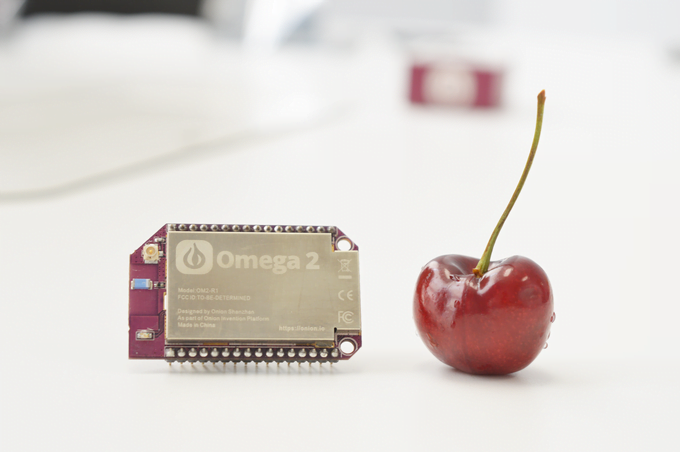
![]()
The Omega2 set out to produce an extremely cheap, extensible Linux computer designed for Internet of Things (IoT) projects with a Kickstarter campaign asking for only $15,000. Now, with only for days remaining in the campaign, the Omega2 team is set to receive over $450,000 in funding from over 11,000 backers. Developed by the Onion Corporation, the Omega2 promises to be an interesting entry for DIY (do it yourself) and commercial projects.
The Omega2 bills itself as an “IoT computer” and, aside from being extremely cheap at $5, is also extremely small. The Kickstarter itself comes with an image comparing the computer itself to a cherry–the project claims the computer-chip by itself is 1/4th the size of a Raspberry Pi (the leading Linux-based IoT DIY hardware platform) and 1/3rd the size of the mirocontroller Arduino Uno. The tiny computer also comes with its own integrated Wi-Fi radio and on-board Flash storage.
The tiny computer is designed to integrate itself into various different form factors of hardware boards that can contain any number of external and extendable components. In fact, one major selling point of the Omega2 is that it is extremely modular and extensible, allowing for multiple components to simply stack atop its primary hardware board to extend its capabilities with controllers, actuators, communications, sensors and more.
The Onion Corporation’s website includes multiple expansions: Bluetooth, Ethernet, OLED controller, relay controller and a servo actuator. The Kickstarter also mentions expansions that add GPS and Cellular (2G/3G) capabilities. Further capabilities for the Omega2 come from 3rd party expansion providers such as Hologram‘s 3G Cellular Expansion for $45 and a large collection of displays and sensors from ControlEverything including a gyroscope, a potentiometer, 3-axis accellerometer, light sensor, temperature sensor.
The Omega2 is the second-gen of the Onion Corporation’s original DIY microcomputer project the Omega, which sells for $19, a bit more expensive than the upcoming $5 computer. The company expects to start shipping the Omega2 November 27, 2016. According to the production timeline the prototype Omega2 has already been built (300 units in test run in July) and the company has already filed for FCC and CE certification.![]()
Hardware and software developers access to API and SDK
Since the Omega2 is a fully operational computer running OpenWRT Linux, developers can program apps for it. Languages that work with the Omega2 include Python, Node.js, Ruby, PHP and C/C++.
Developers gain access to the Omega2 SDK and get the opportunity to write apps that can be listed in the Onion App Store. Assuming that developers cannot find an app in the App Store to suit their needs.
Omega2 also boasts cloud integration through the Onion Cloud. This means that every Omega2 computer can be remotely controlled from anywhere in the world via Web UI or RESTful APIs. (The Omega2 in fact runs its own Apache server on-board to make this possible.) When connected to the Onion Cloud developers can also easily view status in real-time and even deploy software patches/updates to it when it’s in the field.
These elements make the Omega2 an interesting mixture of tools for developers combined with apps and services often supplied by third-parties for other similar DIY platforms. Both Raspberry Pi and Arduino offer many similar hardware capabilities, but similar software tools are services external to the hardware and interfaces themselves. The Omega2 is looking to become an all-in-one solution for DIY and commercial IoT prototyping with these services and tools.
[Source:- Silicon Angel]




